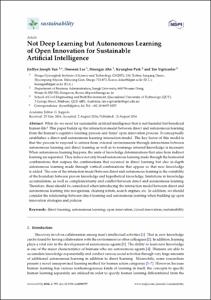Full metadata record
| DC Field | Value | Language |
|---|---|---|
| dc.contributor.author | Yun, JinHyo Joseph | - |
| dc.contributor.author | Lee, Dooseok | - |
| dc.contributor.author | Ahn, Heungju | - |
| dc.contributor.author | Park, Kyungbae | - |
| dc.contributor.author | Yigitcanlar, Tan | - |
| dc.date.accessioned | 2018-01-25T01:07:51Z | - |
| dc.date.available | 2018-01-25T01:07:51Z | - |
| dc.date.created | 2017-04-10 | - |
| dc.date.issued | 2016-08 | - |
| dc.identifier.issn | 2071-1050 | - |
| dc.identifier.uri | http://hdl.handle.net/20.500.11750/5087 | - |
| dc.description.abstract | What do we need for sustainable artificial intelligence that is not harmful but beneficial human life? This paper builds up the interaction model between direct and autonomous learning from the human's cognitive learning process and firms' open innovation process. It conceptually establishes a direct and autonomous learning interaction model. The key factor of this model is that the process to respond to entries from external environments through interactions between autonomous learning and direct learning as well as to rearrange internal knowledge is incessant. When autonomous learning happens, the units of knowledge determinations that arise from indirect learning are separated. They induce not only broad autonomous learning made through the horizontal combinations that surpass the combinations that occurred in direct learning but also in-depth autonomous learning made through vertical combinations that appear so that new knowledge is added. The core of the interaction model between direct and autonomous learning is the variability of the boundary between proven knowledge and hypothetical knowledge, limitations in knowledge accumulation, as well as complementarity and conflict between direct and autonomous learning. Therefore, these should be considered when introducing the interaction model between direct and autonomous learning into navigations, cleaning robots, search engines, etc. In addition, we should consider the relationship between direct learning and autonomous learning when building up open innovation strategies and policies. © 2016 by the authors; licensee MDPI, Basel, Switzerland. | - |
| dc.language | English | - |
| dc.publisher | MDPI AG | - |
| dc.title | Not Deep Learning but Autonomous Learning of Open Innovation for Sustainable Artificial Intelligence | - |
| dc.type | Article | - |
| dc.identifier.doi | 10.3390/su8080797 | - |
| dc.identifier.scopusid | 2-s2.0-84983734669 | - |
| dc.identifier.bibliographicCitation | Sustainability, v.8, no.8 | - |
| dc.description.isOpenAccess | TRUE | - |
| dc.subject.keywordAuthor | direct learning | - |
| dc.subject.keywordAuthor | autonomous learning | - |
| dc.subject.keywordAuthor | open innovation | - |
| dc.subject.keywordAuthor | closed innovation | - |
| dc.subject.keywordAuthor | sustainability | - |
| dc.subject.keywordPlus | Autonomous Learning | - |
| dc.subject.keywordPlus | BOUNDED RATIONALITY | - |
| dc.subject.keywordPlus | Closed Innovation | - |
| dc.subject.keywordPlus | Direct Learning | - |
| dc.subject.keywordPlus | KNOWLEDGE | - |
| dc.subject.keywordPlus | Open Innovation | - |
| dc.subject.keywordPlus | Sustainability | - |
| dc.citation.number | 8 | - |
| dc.citation.title | Sustainability | - |
| dc.citation.volume | 8 | - |
- Files in This Item:
-
 기타 데이터 / 3.03 MB / Adobe PDF
download
기타 데이터 / 3.03 MB / Adobe PDF
download



